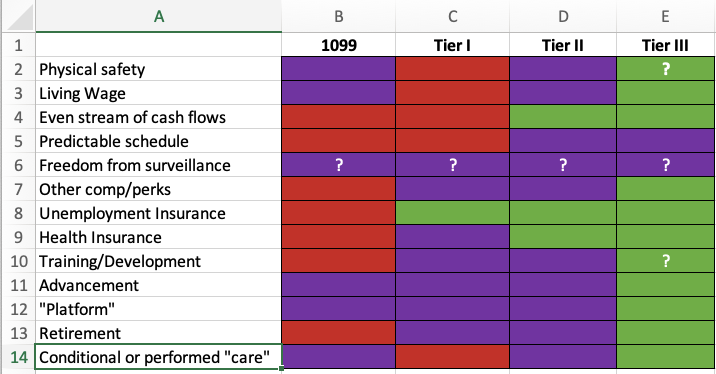Coaching: On Management #7

(I’m slowly bringing my newsletter archive over from Mailchimp. So yes, this issue is several years old; though I've checked through this, some links may not work.)
This month: coaching. When you move from simply organizing the work, to developing people and their performance, you're coaching.
It's a shift in your own management development. Instead of being the subject matter expert or top technician, you're leading a team of people. When your people are better players than you are, you're able to play a much bigger game.
This month, two people who coached athletes to reach elite levels. Against all odds, like every sports story, ever. And from my syllabus, a tool you can use to coach your players
For "This Call is Now Being Recorded," psychologist, coach, and professor Monica McGrath talks with me about the history and practice of business coaching. (And, an audio technology upgrade!)
Thank you for inviting me to your in-box.
I've been reading. (Actually, reading and listening.)
"She always saw something in me. She always knew I was going to do special things in some form. She didn't know what I was going to be."
Sean Foley, on his college golf coach, Catana Starks
Dr. Catana Starks was the first black woman to lead a US Division I men's golf team. An entrepreneur of collegiate sports, Coach Starks pushed just about every boundary imaginable to build a championship team.
In From the Rough (library), Coach Starks' real life as a working mom doesn't make the cut: the on-screen Starks is married to her job. (Sigh.) Otherwise the film is a jewel, and a solid choice for family movie night, too.
Billy Fitzgerald came out of the Oakland As system to coach baseball at a New Orleans private school. Michael Lewis originally wrote about his terrifyingly intense high school coach for the NY Times. His portrait of Coach Fitz became a book, and an entertaining 50-minute audio, Coach: Lessons On the Game of Life. (Library)(Audible)
Starks and Fitz both focus on basics. They look for the promise in each player, and they're explicit about what it will take to live up to that promise. More important, they coach their players on the values underlying elite performance. Things like, don't expect to play if you skip practice.
This is how managing people works, too. It's on you to help your people realize their potential. And everyone has potential.
Fitz and Starks both started coaching in the 1970s; I think they're both now retired. When you're developing people and their talents, winning is a long game.
Today, their former players like Lewis and Foley are out in the world, enriched by what they learned from their coaches, and achieving success in many professional domains.
Is there a Dr. Catana Starks or Coach Fitz in your life?
This Call is Now Being Recorded: Monica McGrath on Coaching
When I was an emerging manager, I was taught to use coaching tactics to help my team members perform. My own coaches were two early bosses who couldn't have been more different: a petite, impeccably dressed (and shod) Italian woman; and a former Marine and proud "grunt."
Helping a team member to prepare for a presentation, to set a goal, or to navigate a sticky workplace relationship: it's all coaching.
In the late 90s, "coaching" entered the workplace as a something separate from management. At about the same time, I met Monica McGrath. Monica is a mother, grandmother, former Vice Dean of Wharton Executive Education, baseball fan -- and an executive coach.
On our call, we discussed coaching's 3-decade evolution into an industry, when external coaches can help, considerations when hiring a coach, and where the field may go.

Thanks to Monica for sharing her time and expertise. Her bio, along with relevant links and notes from the conversation are here!
Management Syllabus Spotlight: Effective 1:1 Meetings: A Guide for Emerging Managers (my own brief guide, available in PDF, from me lol)
"There were quite a number of coaches...that accepted me. So, I just learned from a lot of people. I started reading a lot of things and being a member of the Golf Coaches Association and all those things really helped me understand the things I needed to do."
Catana Starks, on moving from player to golf coach
When we show someone how to grip a golf club, we're coaching for skill. A player who excels in practice, and chokes on the course, needs a coach who can help her find insight.
Whether your player needs insight, or help with skills, you can level up your coaching skills by having solid 1:1 meetings.
1:1s are under-appreciated, under-thought, and under-taught. So, in 2015 I wrote a brief guide. Here's why I share it with emerging managers in companies I work with.
- Truth: Regular discussions about people's goals and progress can keep things moving forward. Structure can help to make these discussions more effective.
- Utility: The guide is brief and to the point: including a live link to a standard, goal-centered agenda.
- Credibility: It's a little bit Hair Club for Men to say this, but I've found this kind of structure to be a useful coaching aid.
- Caveats or qualifications: My guide won't tell you "how to," but "what to." You bridge this gap in real life, by actually having these meetings. That's how you practice your own coaching skills.
There's a thread on the internet advocating what I'd call "social 1:1s." To have meetings where your only agenda item is your team member's lives. The idea is that this will help you to develop relationships.
Sure, do this this every once in a while. Not every week.
Do the math. If you have routine 1:1s, and lead a team of 5, you're spending 400+ person-hours in these meetings. Be a good steward of this time, and focus on the right things: the work you're there to do together.
When you listen to your people, support their development, and help them meet their goals, your relationships will develop naturally.
(If you'd like a copy of my brief PDF, send me a note.)
Reading, &
- A whole bunch of movies featuring coaches and coaching. (Including a non-obvious choice, featuring two toxic and deeply sexist coaching relationships.) Racist and love story tropes cause some films to miss their marks.
- Monica McGrath, Spring Training for Leaders: Time to Batter Up.
- Cate Huston, managing as emotional labo(u)r. (h/t Amy Vernon)
- "The best coaches aren't the best athletes," Julie Zhou on 7 years of managing people. (h/t Sha)
- 50 Greatest Fictional Coaches in Movie History, Bleacher Report. (NB: Yoda is a guru, not a coach.)
From you!
- Brannon Skillern recommends Kim Scott's Lessons Learned, via First Round Review.
- Kate Mundie shared Anne Loehr's profile of Jessica DeGroot, whose Third Path Institute deeply considers building sustainable lives, while working.
What are you reading?
Welcome, new readers! Many thanks to Brian Bishop, Stacy-Marie Ishmael, Cindy Menz-Erb, and Tara Reed, for sharing my newsletter with friends and colleagues in your startup, Coro, #AwesomeWomen and 500 Startups communities.
Until next month,
Anne





